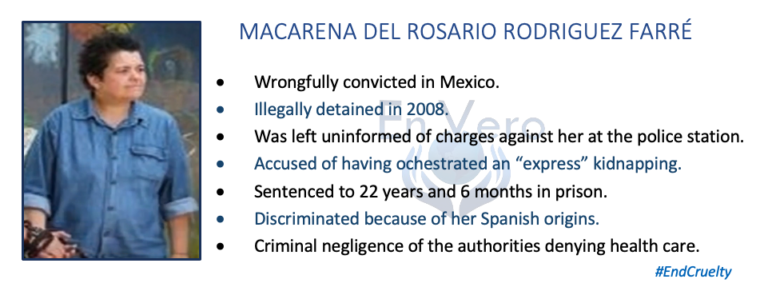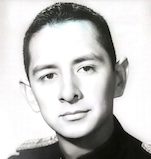Person in charge of the Francisco Leopoldo Zea López Case: Rodrigo Mendoza.
Case Summary
Autor: Rodrigo Mendoza
January 12, 2017
Translation: Jorge. B.
-
Official version
According to the “Arrest Police Report,” issued by police officers on August 30, 2009, Francisco Leopoldo Zea López was arrested in Aragón following a citizen complaint indicating the presence of a parked car “with five people,” one inside “and three more individuals outside the car”(?). Seeing a van arriving, all those outside the car would have fled, leaving only the occupant of the car.
After getting off the truck, the newcomers identify themselves as federal police officers and order the car’s occupant to identify himself. The police officers report that Francisco gets out of the car and identifies himself. Next they ask him to let them check the car. Francisco kindly allows them to do so. The arresting officers discover—according to the terms in the police report—a black bag with thirty bundles of white powder in the right pocket of his pants, a long gun under the passenger’s seat, and a card with the name and physical description of Armando Espinoza, Commissioner of the Federal Police. The report indicates that Francisco has the intention to kill the commissioner.
As a consequence of these supposed findings, Zea López is arrested two times, at the end of which he is sent to the CEFERESO no. 4 of Tepic Nayarit for crimes against public health and possession of a firearm exclusively permitted for military use.
The initial charges also included two for kidnapping, with four victims in each case.
Always according to the police report, the officers who participated in the arrest are: Heliek Elí Navarro Morales and Gerardo Patatuchi Jong.
-
Defendant’s version
On August 29, 2009, at approximately 7:00 am, as he was leaving his job as head waiter at the nightclub “La Casona,” Zea López was intercepted by an indeterminate number of heavily armed and hooded individuals. They arrived in several cars and on two motorcycles, forced him to get out of his car and get into one of theirs. Zea López asks if they are kidnapping him and he is told: “We are police officers.”
Francisco says that following his arrest they punched him and kicked him; covered his face with a cloth; forced him to swallow water; covered his head with a plastic bag; applied electric shocks to his testicles and hit him in the stomach, so that when he gasped for air, the bag would enter his mouth and suffocate him, which they would take out before he lost consciousness. They returned him to the car and seated him in front with his knees pressed against the glove compartment, so that he could not move. Until he was brought to the SIEDO, he was kept on an empty stomach and not able to sleep.
Upon arrival at the SIEDO, the police officers discussed among themselves about the weapon and the drug to be planted in Francisco’s car. The report says that 30 gr of cocaine were found, but when only 3 gr were counted this accusation (“crime against public health”) was withdrawn.
-
Discussion about the supporting material.
- Circumstances of the arrest
The police report of his arrest dated August 30 indicates 3:40 pm as the time the detainee was arrested. However, the complaint of his disappearance made by Zea López’s parents the previous day is a strong indication that the defendant had been detained on August 29, many hours before he was brought to the Public Prosecutor’s Office. The defendant’s family made the car drive between the discotheque and the SIEDO: it took them 10 minutes to complete the distance. Patatuchi, one of the arresting agents, confirmed the length of time during the confrontations carried out with the victim in July 2014.
Consistent testimonies from those who at the time worked as valets for the disco “La Casona” confirm what Zea López said about the date, time and place of the arrest. In the same sense, both the manager and other staff of the establishment testify that Zea López was present during the night of August 28-29, and absent the following night, 29-30, all of which corroborate that the arrest took place on August 29, and not August 30, as the arresting officers claim.
Moreover the calculation that results from the single police information shows that there was an unjustifiable period of time between the arrest and the time he was brought to court.
Therefore, by constituting a violation of fundamental constitutional provisions designed for the protection of basic rights and freedoms, the detention of the detainee for many hours invalidates the entire subsequent action by the police and casts a shadow of doubt over the treatment inflicted on Zea López during that time. A series of subsequent actions will reveal that the physical integrity and dignity of the detainee were also systematically violated, as specified below.
- Pretended possession of a weapon
On the other hand, Zea López is accused of being in possession of a long weapon for the exclusive use of the army. In this regard, it must be said that the police did not comply with the requirements to ensure that the so-called chain of custody of the weapon was followed.
But beyond this serious irregularity, the ballistics report showed that no fingerprints belonging to Zea López were found on the weapon of alleged illegal possession, or traces of gunpowder on him. In his preliminary statement, the detainee stated that he did not know how to use a long weapon, or even a short one.
The plausibility of these statements is clearly expressed through the evidence presented in the document “Prosecutor’s attestation of documents, cash and miscellaneous objects,” where it can be seen that the defendant only brought with him belongings of legal possession: family photographs, credit cards, cell phone, nextel (?), car registration, parking card of the Ministry of Labour and Social Security (where Zea López worked); all these elements suggest an honest way of living, with stable family and work ties. Supporting the veracity of this document, there are statements from character witnesses who portray him as having a lawful way of life; and from witnesses who were with Zea López on August 29, 2009, and did not notice the presence of any weapon in his car. Among them, the manager of the nightclub “La Casona,” who went to Zea López’s car because Francisco was going to give him an invitation to a baby shower that his family would be holding that morning on August 29.
- Alleged kidnappings
There are no victims, or relatives of victims, or witnesses pointing at Zea López as responsible, directly or indirectly, for kidnapping or belonging to organized crime.
The only witness who testifies against him is a co-defendant, Noel Robles Hernández, who points him out without mentioning his name. When shown a photograph, he says that the one in the photo is The Thin One or El Flaco. When he is asked to make out Francisco’s physical description, he says that he has a hooked nose, crooked teeth and big ears. This description does not correspond to Francisco’s physique and leaves out his most obvious feature, which would hardly go unnoticed, his height: Francisco measures 1.90 m. In a country where the average height is much smaller, the co-defendant does not mention it at all.
The order of formal imprisonment issued against Zea López was made following Robles Hernández’s statements on July 17 and 18, September 4, 8 and 22 and November 5, 2009. Such statements, however, have numerous inconsistencies and contradictions; so many and so important that Robles Hernández’s testimony loses all credibility. In effect, the alleged participants change from one story to another, as they change from one statement to another the roles of the participants, and the vehicles used are different in each narrative. Robles Hernández refers to events that he did not personally witness in all cases, without there being any explanation of how or through whom he came to know them. As witness and co-defendant of the kidnappings of which Zea López is also accused, Robles Hernández alludes to the participants by means of pseudonyms; sometimes the same “alias” corresponds to two different characters, without the identity of the persons so alluded to having been established. The contradictions and inconsistencies are so serious that sometimes there seems to be totally different narratives from those that are supposedly the same facts. Robles Hernández himself denies and rejects a large part of these statements, claiming that sometimes these were extracted under extortion or torture, a circumstance corroborated by the expertise provided for in the Istanbul Protocol.
In addition, his own statements regarding his habitual drug use affect not only the credibility of his statement, but also the clarity of his perceptions, his memory and his judgment. It is inexplicable that a fairly serious judicial system could give any value to testimonies totally contaminated by such circumstances and flaws.
Except for what Robles Hernández says and the above-mentioned photographic identification, none of the co-defendants accuses Zea López, directly or indirectly, of kidnapping any of the persons identified as victims in this trial.
There is no opinion or expert opinion that points to Zea López as being responsible for kidnapping or belonging to organized crime.
In the databases of telephone networks presented at trial by the Public Prosecutor, no links are found between the name of Zea López, his alleged nicknames and telephone numbers, on the one hand, and his co-defendants, on the other; or evidentiary elements linking Zea López with kidnappings or organized crime.
In the police reports there is no mention whatsoever linking Zea López with his participation in kidnappings. When the defendant requested constitutional confrontations with the arresting agents, the judge declared the petition null and void, alleging that such reports are not directed against the accused and do not include any facts verified by the agents (?).
Zea López has been consistent in denying any participation in criminal activity or organization, and therefore, has not made any accusation against his co-defendants because such facts are foreign to him.
A thorough reading of the statement by Abel Silva Petriciolet allegedly against Zea López, provided by the Public Prosecutor, does not in fact contain any accusation against the defendant’s participation in the kidnapping of the victims in this trial.
One of the kidnappings that Francisco has been charged with took place when he was on his honeymoon. Airplane tickets and overnight stays at the hotel on the date of the kidnapping were presented as evidence.
Another one of the kidnappings he was charged with took place one morning in which Francisco was working at the Ministry of Labour. Corroborating testimonies were presented in this regard by his immediate superior and his coordinator, as well as the logbooks for those days.
In another of the kidnappings he was charged with, Francisco was at a dinner at his mother-in-law’s. Several guests showed up as witnesses to testify and attest that the accused was there. During another of the kidnappings Francisco was working as chief waiter in a bar.
-
Serious violations of human rights and constitutional guarantees
During the huge interval (32 hours and a half) elapsed between the time Francisco was arrested and brought before the Public Prosecutor, the defendant was repeatedly beaten and kicked, subjected to suffocation and other physical and psychological abuse to have him admit to the commission of facts unknown to him, forcing him to read self-incriminating statements before a camera.
It is important to mention that his co-defendants also claim to have been tortured, which has been verified through the procedures provided for under the Istanbul Protocol. In all cases there has been a violation of due process from the time of arrest.
Among the constitutional rights and guarantees violated include the violation of the presumption of innocence; personal integrity; due process, including the right to be heard; freedom; and image.
Despite the abundance of supporting material that exonerates him and even makes impossible the truthfulness of the accusations made against Zea López, the judicial delays and the extremely long and protracted trial can be explained only if one pays attention to other incidents of extreme gravity that constitute the backdrop of this drama, which has led Francisco and other co-defendants to remain in detention for years.
-
Backdrop
It concerns the existence of a network of thugs made up, among others, of numerous members of the police dedicated to the kidnapping of people and the extortion of families, in order to obtain sums of money for the return of the victims.
In view of the strong social and media impact of the kidnappings, some of which have ended up with the death of the victims to the general alarm of Mexican society; and being that the police organizations must render accounts to the society and to the civil authorities for the existence of these facts, including their efficient control and repression, members of these organizations are forced to present results of their investigations, pointing out the culprits of the facts and informing of their apprehension. To this end, they have not found a better solution than to manufacture culprits, through the capture, mistreatment and extortion of supposed members of criminal gangs that plan and execute kidnappings. This strategy achieves the double objective of allowing them to comply with their accountability and to bury their own illicit actions, making the passage of time to contribute to oblivion and impunity.
It is here where Mexico has a very serious problem that can lead to perversion and complete ruin of its institutions.
The network of complicity reaches high levels of the government and the judicial power, inducing helplessness and demoralization in the victims and serious distortions and deterioration of the rule of law. Fortunately, organizations dedicated to the defence of human rights and civil society are already communicating with each other and coordinating their efforts to identify and denounce those involved, and seek the restoration of truth and rights.
-
Recommendations
Given that, on the one hand, there is no supporting evidence of criminal responsibility against Zea López and, on the other hand, there are strong indications of criminal conspiracy by the police and judicial system, the Canadian Association for Rights and Truth considers that the accused should be released immediately, with due regard for Zea López to file civil suits for the very serious damages suffered by him in his physical and moral integrity, and by his family, deprived for years of his affective presence and financial assistance.
An independent investigation supervised by the highest political level (Chamber of Deputies and Senate) should also be open to take the necessary measures to expose the modus operandi of the real perpetrators of kidnappings and torture, dismantle the network of complicities that operates in the capital itself of the State of Mexico, and bring the guilty ones to jail.
News:
- News on Dec. 2, 2019: Gualberto Ramírez: the Agent of the Mexican Government who Invented Kidnappings (El Universal, trans.)




